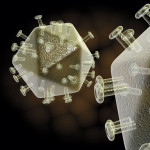Researchers have zeroed in on a means by which HIV manipulates the immune system to facilitate its initial infection in the body and establish a permanent viral reservoir.
Publishing their findings in the Journal of Virology, researchers sought to build on their previous findings that HIV inhibits the production of the natural antiviral interferon. This leaves the virus more free to spread from cell to cell and ultimately throughout the body.
To their surprise, the investigators found that the virus also induces more than 20 interferon-stimulated genes, or ISGs, in immune cells known as macrophages and dendritic cells. Many of these genes prompt virus-fighting effects. Although ISGs are a critical line of defense against viral infections, paradoxically they can also help viruses persist in the body by restricting their replication in cells without eliminating the infection of those cells. A cornerstone of the viral reservoir is the collection of immune cells that are latently infected with HIV, meaning they are not replicating; such a resting state keeps them under the radar of antiretroviral treatment, which only works on replicating cells.
Thus, HIV has apparently evolved to both suprress interferon and stimulate ISGs, effects that facilitate its spread through the body and maintain the overall infection.
In the future, scientists may be able to develop means of boosting the expression of antiviral genes to not just slow viral replication but halt it entirely.
To read a press release about the study, click here.
To read the study abstract, click here.







Comments
Comments